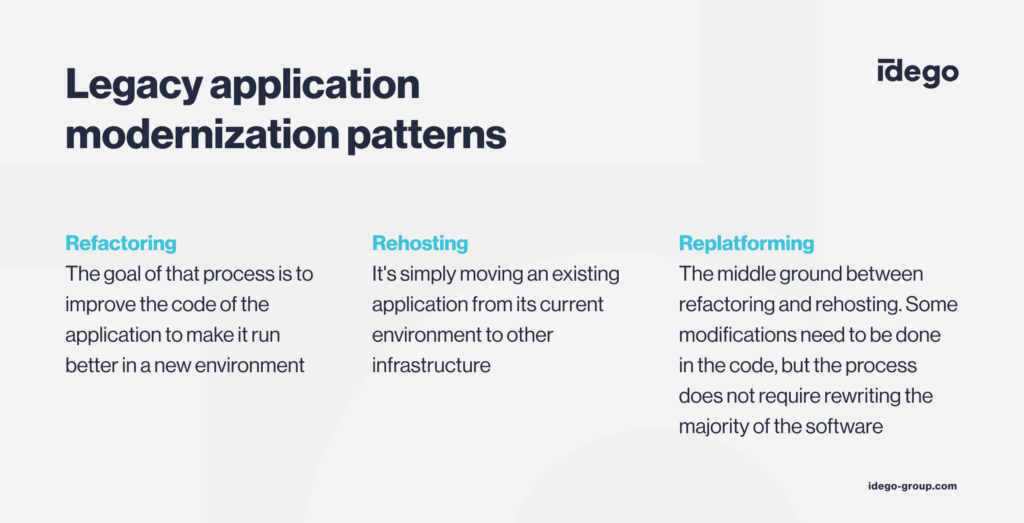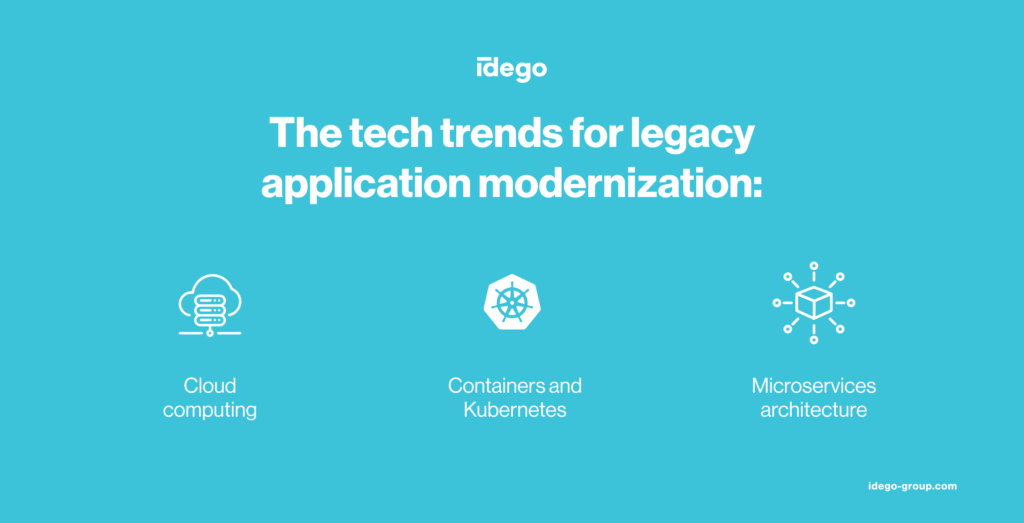What is app modernization, and when should you consider it?
Do you feel like your business applications are no longer enough for your organization? It may be the right time for you to consider app modernization. You can improve your business solutions performance and leverage the most popular technical innovations. From this article, you will learn what it means to modernize applications and when you should do it.
Some companies have been on the market for quite a long time and still operate using the same software they have built at the beginning of their journey. Having a custom business application is a nice thing, but even customized business solutions require modernization sometimes. But how to tell when it is the right time to modernize your app? Read our article to learn more about legacy application modernization.
What is app modernization?
An app modernization constitutes, in short, the process of updating legacy applications following the newest standards and trends. Why is it sometimes necessary? Companies need the software written in a modern way in terms of the computing approach, programming language, frameworks, etc. Thanks to such software, they are capable of taking advantage of the newest technologies such as cloud computing, artificial intelligence, machine learning, etc.
When should you modernize applications in your company?
Engaging in the application modernization process is recommended if an enterprise cannot retire the old software and move to a different one, because of the great costs of such an approach. App modernization allows your company to grow by providing you with scalable software with various, interesting functionalities. It gives you better tools to protect your resources and investments. Properly planned and performed modernization of business applications in your organization can help you reduce expenses and allocate your resources better.
Enterprise application modernization is being performed by more and more large companies nowadays. Having business applications that meet all the modern standards and users’ expectations is the matter of preserving the competitive advantage on the market. So, when should you modernize applications in your company? Think of your business app modernization if you feel like your old solutions hold you back and you can’t grow bigger without the newest solution. Make a list of the features that you find attractive and indispensable for your brand’s success. Check if your software meets the criteria on your list and if not, discuss your application modernization with the experienced professionals that know how to renew your apps.
See also: Building apps with Python – what does the process look like?
Legacy application modernization patterns
Legacy application modernization patterns are nothing else but approaches that can be followed during the app modernization process. As already mentioned, there is quite a lot that can be done with the business software to make it newer – more modern. If the retention and retirement of the old systems are out of the question, you can decide on a few others.
Refactoring
In this case, refactoring means the same as “rewriting”. The goal of that process is to improve the code of the application to make it run better in a new environment (for example, in the cloud). Such an approach to app modernization is usually required to change the architecture from monolithic to microservices.
Rehosting
Rehosting is simply moving an existing application from its current environment to other infrastructure, usually a newer one, like a cloud. There is no need for optimizing the code – at most small adjustments might prove necessary. It is not such an intense process as in the case of refactoring of the app, but it still gives you more operational flexibility.
Replatforming
This type of app modernization approach can be considered the middle ground between refactoring and rehosting. Some modifications need to be done in the code, but the process does not require rewriting the majority of the software. So, you migrate to a different runtime platform, there are only small changes in the code, but there are no new features, functions and the original structure remains unchanged as well.

Key technologies and solutions for legacy application modernization
So, what type of solutions do you need to have in mind, when considering business app modernization? Apart from highly advanced technologies, some trends are already considered mature in the world of IT, and leveraging them doesn’t involve any serious risks.
Here are the tech trends for legacy application modernization:
- Cloud computing – there is no doubt: more and more companies every day move to the cloud. There are many types of clouds (private, public, hybrid clouds, etc.) and each gives you specific benefits. Operating in the cloud can help you reduce expenses, improve collaboration and support your employees’ mobility.
- Containers and Kubernetes – Kubernetes is a container-orchestration system and containers can be leveraged for packing, deploying, and running units of your software in the clouds. Kubernetes helps to automate these processes. This solution will give your organization better scalability and portability.
- Microservices architecture – a traditional approach to application development was called monolith development. The product was built and operated as a complete codebase. Nowadays, microservices architecture proves to be an interesting alternative for classic, monolith architecture. In microservices, the application consists of smaller pieces of code that can be deployed, updated, and run independently.

Those are the most important tech approaches and technologies useful during the app modernization process. The experts that handle legacy application modernization will analyze your organization’s needs and current software capabilities and suggest the best way to optimize them.
Application modernization — benefits and challenges
Although app modernization is sometimes crucial for your business growth, there are some challenges that you should keep in mind. First, find a highly experienced team that will successfully modernize your outdated software. Remember that modernizing your business applications can be expensive, complex, and time-consuming if you don’t choose the right team of experts. Application modernization using your in-house team is a rare case, mainly because such professionals need to have a specific set of skills and considerable experience. The efficient way to deal with app modernization is by cooperating with an external IT service provider like Idego Group.
Application modernization benefits
Each time you introduce changes, you experience some challenges and have to deal with the obstacles on the way. It is worth it, though. Here are the benefits of going through app modernization:
- You stay ahead of your competition – implementing the newest technologies allows you to offer more to your customers than other companies. You are reducing expenses and increasing efficiency, so you can boost the growth of your company and focus on improving your products and services.
- Enhanced compatibility – the modernized application can be successfully integrated with the new generation business tools, platforms, and technologies. This way you can work smarter.
- Improved efficiency – the flexibility of the modernized application will allow you and your employees to work more efficiently. Using modern software with practical features makes all business processes easier.
- Reliable cybersecurity – obsolete applications are prone to cyberattacks. That is, mostly, because outdated software is rarely compliant with the current cybersecurity standards. By modernizing your business applications you improve the security of data and other resources.
We can help you optimize your business software. Contact us, if you need a team of experts that will modernize your application.





